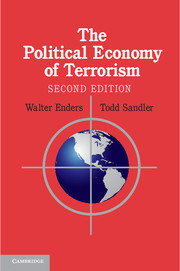Book contents
- Frontmatter
- Contents
- Tables and Figures
- Preface
- One Terrorism
- Two The Dilemma of Liberal Democracies
- Three Statistical Studies and the Dynamics of Terrorist Behavior
- Four Counterterrorism
- Five Transference
- Six International Cooperation
- Seven Hostage Taking
- Eight Terrorist Groups and Their Organization
- Nine Before and After 9/11
- Ten The Economic Impact of Terrorism
- Eleven Homeland Security
- Twelve The Future of Terrorism
- References
- Author Index
- Subject Index
Five - Transference
Published online by Cambridge University Press: 05 June 2012
- Frontmatter
- Contents
- Tables and Figures
- Preface
- One Terrorism
- Two The Dilemma of Liberal Democracies
- Three Statistical Studies and the Dynamics of Terrorist Behavior
- Four Counterterrorism
- Five Transference
- Six International Cooperation
- Seven Hostage Taking
- Eight Terrorist Groups and Their Organization
- Nine Before and After 9/11
- Ten The Economic Impact of Terrorism
- Eleven Homeland Security
- Twelve The Future of Terrorism
- References
- Author Index
- Subject Index
Summary
Contraband such as automatic and semiautomatic machine guns, bazookas, hand grenades, suicide vests, and hand-held rocket launchers can easily fit into a ship’s cargo container. The Department of Homeland Security (DHS) is understandably worried about these potential terrorist weapons reaching US shores. The Container Security Initiative (CSI) is designed to secure US ports against the importation of these and other dangerous materials (see Chapter 11 on homeland security). With the cooperation of its trading partners, US inspectors in port cities such as Rotterdam, Singapore, and Hong Kong inspect and label cargo before it reaches US shores. The CSI is predicated, in part, on the notion that terrorists make choices by taking costs and benefits into account. If it is more difficult to smuggle weapons aboard a commercial plane or by air freight, terrorists will seek out a “weaker link” or softer target. Thus, unless US ports of entry become more secure, DHS predicts that enhanced airport security will make US ports a weaker link.
The bombing of the three train stations in Madrid on 11 March 2004 is another instance of terrorists finding a weaker link. The bombs, designed to explode during rush hour, left 191 dead and injured more than 1,200 others. The coverage in the Spanish press and the effects on the Spanish psyche rivaled the influence of 9/11 in the United States. One indirect consequence of the attack was the unanticipated victory of the Socialists over the ruling Partido Popular party. Why did al-Qaida decide to attack rail passengers? One rationale given for the train station bombings was that terrorists found that skyjacking was too difficult and too risky to be successful. The main Atocha train station and the two smaller stations were softer targets.
- Type
- Chapter
- Information
- The Political Economy of Terrorism , pp. 138 - 169Publisher: Cambridge University PressPrint publication year: 2011



